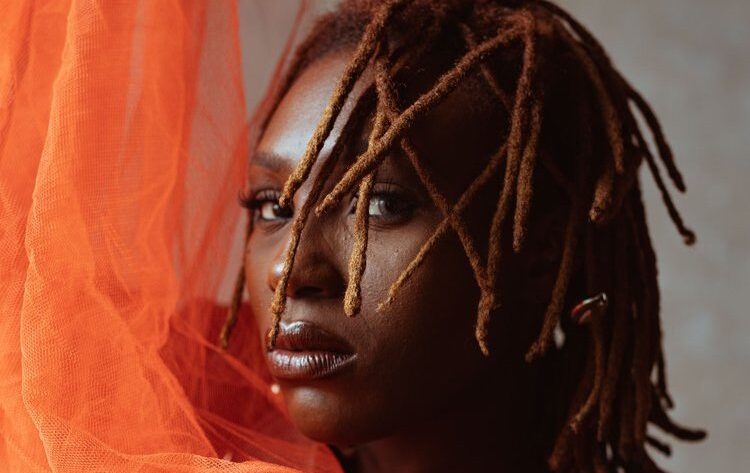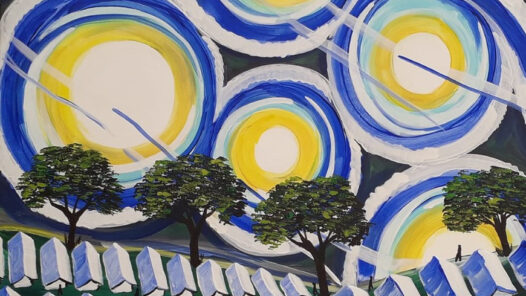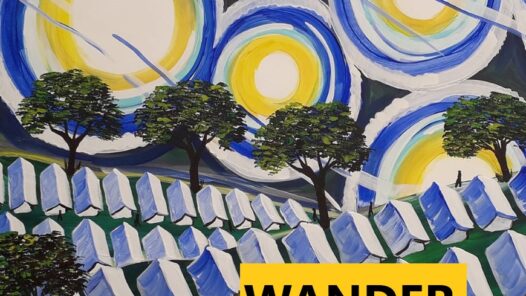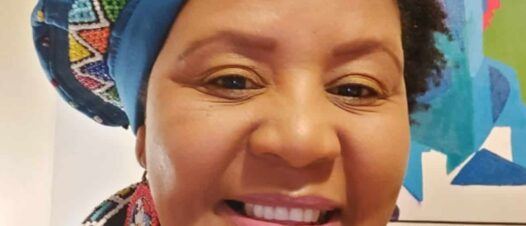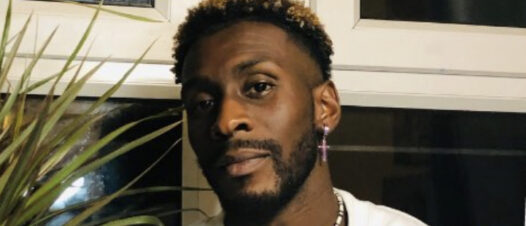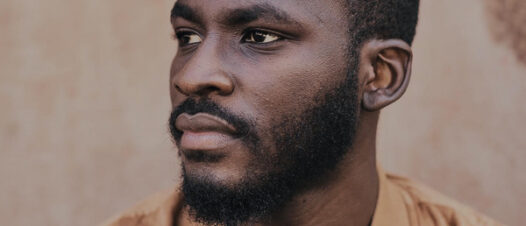Felicia Olusanya aka FELISPEAKS, is a Nigerian-Irish poet, performer and playwright from Co. Longford who’s currently featured on the Leaving Cert English Curriculum with their poem ‘For Our Mothers’. They’re a member of WeAreGriot, a poetry collective consisting of herself, Dagogo Hart & Samuel Yakura (who we talked to in the last episode) and a board member of Poetry Ireland.
They also opened for Kate Tempest at Vicar St, and have performed at festivals such as Mother Tongues, Women and Children First, in Belgium, Wexford Literary Festival, Cuirt, and the National Concert Hall’s Notes from a Quiet Land in 2021.
We’ve a great conversation about racism, George Nkencho, feminism, and their creative process – and their latest video, ‘Tough Meat’ which was just released a few months ago.
You can find them @felispeaks on the socials // felispeaks.com
Enjoy the conversation!

TRANSCRIPT:
Bairbre Flood: Hi, and welcome to another episode. Hope you’re all keeping well. My guest today is Felicia Olusanya AKA FeliSpeaks a Nigerian Irish poet, performer, and playwright from County Longford. They’re currently featured on the Leaving Cert English curriculum with their poem For Our Mothers, which is a really amazing achievement.
FeliSpeaks is a member of We Are Griot a poetry collective consisting of herself, Dagoga Hart and Samuel Yakura who we talked to last episode and is a board member of Poetry Ireland. They also open for Kate Tempest at Vicker Street and have performed at festivals such as Mother Tongues, Women and Children First in Belgium, Wexford Literary Festival, Cuirt and the National Concert Halls Notes from a Quiet Land in 2021.
We talk a lot about racism, feminism, and their creative process under latest video, Tough Meat, which was just released a few months ago.
{MUSIC} Come here. I was just watching, I was watching your video again, the new video. Tough Meat amazing. Awesome. Are you going to do more with music?
FeliSpeaks: Yeah, absolutely. I’m doing more with music working on an EP. I just finished. And I’m trying to get sponsorships so I can do an EP launch and hopefully make another music video before the end of the year.
Bairbre Flood: Cool. And how did, like, who’s doing the music on it? Are you, do you write music as well?
FeliSpeaks: Mostly it was a collaboration between myself and some young producers, but, I had the sound in my brain and I basically explained it. More or less.
Bairbre Flood: Did you know when you were writing it that it was going to be with, with music or how, how did it start forming with you?
FeliSpeaks: It was one of the poems that came to me differently to how the others usually would. So I had some inkling that at first I didn’t know if I was even going to ever perform it because it was so different. It didn’t come like a regular poetry format, so I, I’d always thought that it wouldn’t be something I would do something with, but after a while I could hear the beat to go with it. And then I just kind of like evolved with that from there on.
Bairbre Flood: I love your other stuff too, but I really like this tapping into that feminine anger and how would you describe that? Like, would you describe yourself as feminist or what would that mean to you?
FeliSpeaks: Yeah. I would describe myself as a feminist. I just believe in equal rights for. All genders and all people. I think that’s generally what feminism is. But I think on top of that, haven’t seen firsthand variations of injustice specific to women and then specific to black women, and then specific to cultural behavior within being a Nigerian Irish person, blah, blah, blah.
So I suppose through the layers of my identity and experiences I’ve had my feminism valid.
Bairbre Flood: Yeah. So I like to, you see obviously there is a huge difference between the way feminism developed in Europe and, and white feminism, which was often an exclusionary to women of color. And, and so how, how has, like being Nigerian, how has that added to your feminism?
How has that like deepened it?
FeliSpeaks: I think by watching the general community of women older than me, my mom’s generation And beyond kind of like hear are their thoughts and what they’ve conceded to you and accepted and deemed as normal and watching my natural behavior be quite rebellious to that.
I think I’ve understood more the re the need for my interpretation of feminism because of how I was raised.
Bairbre Flood: Yeah. Like do, do you see connections between. Say Irish women and Nigerian women, or how, what do you think about that? Or do you think we make enough connection between that? Or do we just kind of forget about people in Africa?
FeliSpeaks:
I think we often in the west forget about people in Africa. I think that’s just a given everywhere in the West. I don’t think Ireland is a specific exception. But I do think that women in Nigeria are well aware of their implied positions. And their implied roles and what they’re supposed to fulfill.
And I think on top of that, there is a lot of taking more freedoms like it could be, it’s not like, I dunno how to explain it. You’re not just walking down the street and people are lobbing stones at you, but like if you were to bump into a guy at a supermarket and he didn’t like your tone, you know, it could be a problem and nobody would help you, if that makes sense.
Jeremy. So I think. I think women in Nigeria know exactly how to navigate the sexist and horrendous kind of like moments that they encounter and me having been raised as a Nigerian but in a more liberal society, has had the privilege to dream of more feminist ideals within that context. So I’ve had the privilege of not being indoctrinated without options.
So it’s different from being raised in Nigeria as a Nigerian versus being raised in Ireland. As a Nigerian, you learn all the same traumatic like or dangerous rhetoric, but you have more of the freedoms to fight against it. Does that make sense?
Bairbre Flood: Yeah, absolutely. And it also – being Nigerian Irish, it gives you that within your family and within your culture, but also within Ireland, you can add so much to Irish culture because you’re bringing all the, the divine feminine from Nigerian culture and, and you’re bringing all the traditions and experiences and culture. Do you feel that, do you feel like you’re sharing as well so much?
FeliSpeaks: Absolutely. And to actually go back to the question that I didn’t answer there yes, there’s similarities between Irishness Irish women and Nigerian women because I think one of the biggest things that dominates both our cultures is religion. And before that would’ve been colonization. And what those two things principally take away from you is your culture, but beyond your culture, the history of your culture too.
I think that’s really scary because there’s one sense of you have your culture stripped from you purposefully, and you’re aware of it versus you have that done to you. And on top of that, the history of what your culture should look like. Is more or less faded and you can’t reference it even if you’re trying to fight against what was imposed on you.
And I think that’s what Nigerians, Nigerian women specifically and Irish women specifically, are really battling with. Like what was our roles and our dynamics and our importance before colonization and before religion. And I think religion has since. Automated what being a woman should look like. It means being chased.
It means being pure. It means being specifically set aside for the pleasures of either a physical man or a spiritual God that has masculine energy. So it’s all, a lot of these things has changed what women do in society, and so we don’t, we no longer or we don’t often, Find what our roles were beforehand.
And I think one of the interesting things is that on top of that, women have in both Irish and Nigerian society has also been through the indoctrination being upholders of the thing that takes away our culture because it feels safe and you’ve been told it is safe. And I think there’s that really weird, ironic dichotomy of the thing that’s killing us is also the thing that we are like championing at the same time.
Very weird, but I think it was a natural and gradual, like obvious eventuality for women in both societies. But yeah, one of the biggest things would definitely be religion and lack of like cult roles in our cultural pasts. So I think the video really I needed, I really wanted the video to, first they feel uncomfortable, but also to kind of shout out the major themes that in case you miss it, in the lyrics, I think I’m having it quite glaring that this is about consumption.
This is about rebellion, this is about non-conformity. And that people are able to see parts of themselves in it or parts of themselves that they wish they had the bravery to be part of. Yeah.
Bairbre Flood: Yeah. I don’t think it’ll get on the Leaving Cert this one though.
FeliSpeaks: Definitely. I don’t think so either.
Especially cuz of the the visuals. It was funny because I was on the six o’clock show when it just came out. Maybe it’d been out about a week, and I was asked to come on and talk about it, and we saw the video and they played about like the first 10 seconds of it. And then one of the hosts was like, yeah, I, you guys, you know, that’s all we are allowed to play, so you could go find out yourselves when you Googling.
And I just thought it was really funny because really and truly there isn’t anything. Vulgar about the video. Like it’s true. I’m not naked, I’m not, I’m, I’m not bleeding. And that’s obvious. Do I mean, like, I, I just find it really interesting that things that are uncomfortable, Are, are hard to consume by the public or like we find hard to promote and consume because they just unnerve us.
But I think it just returns to what the purpose of art is, is to, I forget who set this quote, but it’s the comfort that disturbed and disturb the comfortable. And I find it fascinating that artists or people that critique. Are going against that, that main principle.
Bairbre Flood: It is uncomfortable to watch. The first time I watched it, I was, I was shocked, you know, like I was shocked.
FeliSpeaks: Yeah. I, I was like, oh yeah, just, you know, you’re not really expecting. I don’t know what to expect, but it’s especially cuz it’s a poem.
Bairbre Flood: Yeah. Can I just ask you some general, like a question about your writing process in general? So like, maybe there’s two aspects to it.
So in general, how do you keep your cup full? How do you – you know, whether there’s self-care – is there things that you do to help foster your creativity?
FeliSpeaks: Yes.
By not being pressured to create constantly. I think we get into this, like, especially when you start like being recognized and being known as an artist that creates blah, blah, blah.
We get into this really weird necessity to consistently create, like you’re just turning things out and I think that generally waters down what you have to say and it takes away parts of its importance. And for somebody like me, like last year, I was consistently busy, but I wasn’t consistently churning out new pieces.
Does that make sense? Because I needed a time for them to like, I don’t know, breathe inside me. I needed time for it to germinate. So one of the things I do make sure not to do is be in a weird cycle of constantly creating new work just because of the amount of effort I wanna put into each piece. And Tough Meat took me like a whole year.
It was already written, but it took me about a year to really give it the life that it needed. And I’m glad it took that long. Cause I feel like now it’s eternal. Like, cause I put 110% into that video, it’s gonna live eternally for me. And I’m not, there’s no part of it that I would want to be like, Ooh, I wish I did more of this, or less of that.
So one is not to be constantly creating two, it’s to consume other creations. I think one of the things also that when you’re a good creator, you get into this bubble of like, only. Listening to your own thoughts. And I think that could be quite detrimental because creative energy is like a flow. You need something to come in and something to come out in some senses.
So other things coming into your, into your mental space helps you think about things you are already thinking about slightly differently or it helps you just throw it all away and realize that was a stupid thought. You know? So consuming other people’s creations and I think I try to consume variety.
When I was younger and when I was still really learning how to write poems and how to perform poems, I was listening to a lot of poetry. I was listening to a lot of performance poetry. Now I consume a variety of types of art. One of my favorites would be comedy. I love standup comedy.
I think it’s an art form that I think we don’t give enough props for its technicalities. So I’m constantly watching standup comedians just to like, learn how about different parts of performance, like how to get comfortable in front of a crowd, like what you do in pauses how to hold your body, to keep your, keep your audience engaged, blah, blah, blah.
So I watch a lot of comedy. I watch random TV shows. I go watch my friends perform. I listen to podcasts. I engage with like conceptual ideas often. I drag my friends into stupid conversations often. So yeah, those things.
Bairbre Flood: Yeah, it’s interesting the comedy cuz I suppose. Yeah, the spoken word that you do at comedy, I never really saw that connection before.
I mean, obviously comedy cuz it’s fun and you need to have fun as a person and as a creator too. Yeah, that’s, it’s interesting. Mm-hmm. Like do you get nervous before you go on stage? Do you get stage fight ever or you seem so natural?
FeliSpeaks: I get nervous before I go on stage. Every time. Every time I feel like I will throw up.
But as soon as I get on stage, I’m completely fine. Which is a weird thing, but. Yeah, it happens every single time. I feel quite nervous. I’m not like hopelessly nervous, just a bit like, ooh, ooh, there’s people here. But then as soon as I can hear myself through a mic, I’m totally grand.
Bairbre Flood: That’s good.
Okay. We’ve touched on a little bit that like mainstream spaces can be a little bit conservative, you know, just, it’s like, you know, they have, there’s certain parameters or whatever, but like, say in the literary world or where, where you would’ve started off and, and where you were operating. Do you think there’s enough space for Black Voices or for marginalized writers, or how do you think, first of all, do you think there’s enough space?
Do you think Ireland is doing enough and, and how maybe commissioners and editors and gatekeepers can open that space out more, do you think to black writers or to, to marginalized race?
FeliSpeaks: I think that one’s hard because. I think I see more of the opportunities now that I’m in the industry, but beforehand not so much.
I think my desire to create and be, and be a creative drove me here rather than, like there was, I was brought in because I was searched for it. That makes sense. And I think one of the things now is there are a lot of. Organizations or art related spaces that are opening up to specifically marginalized groups of people.
But I think the problem is the marginalized groups of people aren’t even seeing them. So there’s this really weird lag in information I think. Whereas this communities of people, I think also, I think we underestimate how. New Ireland is to this vast amount of culture at the vast amount. At the same time, the black Irish community has a large amount, is only about 23, 24 years old.
Really? And so I think what is still this, like, it’s one of those things where you’re, we’re trying to find a solution for something that has 12 problems, but we think it has one, right? So the one problem we’re all looking at is how do marginalized groups of people have more artistic opportunities?
How do we make that more accessible as an art organiz? Whereas as a part of it, that’s also like these groups of marginalized people are less than a generation in the space. That’s one. So two, we have cultural distrust about things that don’t have, about industries that don’t have obvious lines to success.
Right As a marginalized group of people, if I enter a country I’ve never been before and I bring my kids and we’re 20 years in the space, I’m not readily advising my child to become an artist. So if I’m a marginalized group of people and I’ve just raised my child here, and I’ve been here less than a generation, I’m not readily advising my child to be an artist.
That’s one. So we have groups of people in the country that. And it makes sense in terms of survival instincts. Be a doctor, be a lawyer, be a pharmacist. Be do the jobs that would make you pillars as well as an important facet in society. It not only, not only helps you retain some sort of integrity, but it also means that you.
Not just integral to the family, but you’re integral to the society as a whole. You have better reasons to stay in the country. So you have that dynamic. And then we have white Irish people basically realizing, okay, we have these, these groups of people here. Let’s maximize all the talents. In the, in the groups of people that are in the country.
So if we have all the life threatening sectors sorted, what about our art? So cause art should reflect the people in the country. It should do you mean? And so we have this struggle because those children of the mar marginalized groups have to decide to want to be artists first. So we have to get past all those barriers of.
Marginalized people being in the country on the emotional template of survival and start moving up to, we’re thriving. And the only ways to do that realistically is how we are already doing it right now, where we watch like the very minority within that marginalized group decide to be these types of people.
I would be one of those super minority in the marginalized group. People that is an artist, but not just an artist part-time and doing it cause they love it and because they have interest, but doing it as quote unquote successful person. So we’re gonna need a like at least a couple more decades of those types of people before it becomes a viable option for marginalized groups of people or else realistically.
And like, what is the word for it? Evolutionary. Like on an evolutionary basis it would be stupid.
Yeah. Do you know what I mean? So it’s a multi-layered problem that we think has a one pronged answer, but it doesn’t. And to get a group of people out of a mentality of survival, they have to feel many things. One is accept. Whereas right now, is it not just bloody Island is full. Bitch. How, how, how do you get, you’re not gonna have marginalized, usual people readily available to pour art into the country.
Basically. What? This full isn’t it. Let me just do my little working in Tesco, let me just do my nursing job and take home the bacon and be good. You know what I mean? So there’s, there’s multiple layers to that problem, and I think it. A realistic approach is what England did by having just multiple generations of black people in the country.
Bairbre Flood: So we just have to wait a bit longer?
FeliSpeaks: Yeah. And I No, no. It sounds, it sounds crazy. I think, I think what the organizations are doing is already, like, you are hardly gonna go into people’s communities and be dragging them out the place. Like there isn’t more that can be done from my, from my observation.
From my observation, I think there isn’t more that can be done that time wouldn’t naturally.
Bairbre Flood: Yeah, well maybe become like, become less racist as a country quicker – or less xenophobic
FeliSpeaks: Yeah, that’s a big one. And even at that, like, I think why I don’t have those sentiments is because I think racism will always exist.
Bairbre Flood: Oh, controversial.
FeliSpeaks: Yeah. I, I genuinely think we can’t eradicate racism because as humans, We are obsessed with categorization and we’re obsessed with power, and I think whoever has the power controls how the categorized are treated.
Bairbre Flood: I hope you’re wrong, but
FeliSpeaks: Yeah, me too.
Bairbre Flood: I think it’s possible you could be wrong because, I dunno, you know, ideas can change so much and things that we think are so entrenched sometimes can just flip sometimes for whatever reason in 50 years or mm-hmm. I don’t see it happening anytime soon though.
FeliSpeaks: I think part of why I’m like a little, oh, I don’t know, raising my hopes is painful because as of like, what was it, 2020 in Ireland was a really hard year. I think 2020 in Ireland was really hard because like Black Lives Matter hit the country and we were like, oh my. Racism. No. Like we could have, I, I thought it was hilarious cuz we, we could not believe as a, people we’re like, no.
And then we all kind of like really banded together that summer, put up black squares on our Instagram and then they got artists and then there was this, I think it was like this accelerated, let’s deal with it and just kick it out and then everything is gonna be totally fine. And it seem, it seemed about like 2021.
We were like, yeah, that’s done. We handled that last year, didn’t we? And you’re like, no, that’s weird. You, you know, and I think what was really chilling about about the year was 2020, I think it was the year George Nkencho got shot in Blanche. So after having, The summer of banding together and protesting and really getting our voices out there.
By the end of that year itself, new Year’s Eve, we reminded ourselves, it was like, it was like a real, it was a real like reminder that, oh, oh, this is not a, you just get to have a couple of protests and it’s done. Like this is real. And I think one of the things that we often do as Irish people is like, no, no, no, we’re not like, We’re not like England, we don’t do those things.
And it’s like, yeah, but you still do them.
Bairbre Flood: Yeah. And I think that’s the thing with the difference between racism as like a, a, a thing. You just see people, but then the, the institutional and the like, the really it’s in the fabric. It’s in the foundation. Yes. And, and I suppose that’s that. Needs to be changed.
People can be individually racist all they want in their sitting room or whatever, but it’s when it’s in the institutions and it’s in Yeah,
FeliSpeaks: the family because George Nkencho’s family still don’t have justice. It’s really sad. Like there was a reminder obviously cuz he had passed. New Year’s Eve and like the family is trying to get some sort of like anything to happen.
They keep doing this whole like, oh, we’re having reviews, we’re having a conversation, we are disciplining. And nobody got fired for killing him. Like nobody, like there’s no, there’s no Address to the nation about it. Like the worst drug dealers could be in Talaght and they’d be, they’d be taken into custody.
Not a bullet. Do you mean like, I think what is really upsetting is that these spaces, the space that it happened in, like in a marginalized space like Talaght or Blanche or whatever, something is always happening in those faces and people aren’t dying. Yeah. I mean, I think that was, it was so cold to like to ingest because if it was somewhere like Don Drum, it would be like, whoa.
It would’ve been like, I think even white Irish people have been really confused. But I think the fact that it happened in a disenfranchised space where things happen all the time and his life was still taken was probably. It sounds awful, but, but it was probably why it was so painful. Like, nobody dies here by the police and they have all the carry on all the time.
You know, things like that. Do you know how many taxi drivers, taxis I got into and they brought it up out of nowhere around that time just to let me know that my, my thoughts before I’ve said them out loud are wrong. What? Yeah. I’ve had taxi drivers tell me how. Well, he was sure he was, he had a knife on him, didn’t he?
And I’m like, are you listening to yourselves? We have gang wars, known drug gang wars in these spaces, and nobody ever does fuck off. Sorry, I don’t wanna keep talking because I just, just get really irritated. That’s why like when you, when when you mention like you, you feel like it, there’s a hope to you that racism could die.
Hmm. As a black person, it feels so not real because even when you’re not dealing in that direct circumstance, even when I’m not talking to anybody about George Nkencho, even when I’m not trying to defend his existence, I have people actively wanting to let me know that it wasn’t racist that he died.
Jeremy, those things are so, and, and those are people that will tell you that they’re not racist. That taxi driver would be like, I’m not racist, I just took you home.
Bairbre Flood: Like I mentioned in the intro, fairly is a member of a poetry collective consisting of herself to Dagoga Hart and Samuel Yakura, who we heard from in the last. Between them, they run an open night called Talkatives, which creates a space for spoken word artists in Dublin. This collective is called We Are Griot.
And I asked Feli, what is a Griot?
FeliSpeaks: A griot is a bard or a storyteller? An and I think one of the, again, bringing some narratives between Irishness and Nigerian is, is that idea. Transferring information, using music, using art using, and it’s also has an undertone of spirituality to it as well. Being in the role of a Griot or Bard I think Bards had that really that strong sense of importance in community, in Irish society.
And so the Griot has similar. And in a place like Nigeria, There’s approximately, I think, 600 languages and cultural groups or ethnic groups to go with nearly every single one of them. One of the things that has crossed over in the three major tribes in Nigeria is that sense of a part or that sense of Rio.
And in structural, how do I say, like, communities before colonization. Andreo had a structural importance. So yeah, it’s that mixture of being a storyteller, a poet, a performer but also having that spiritual element. And you’re supposed to be either soothing the people or transferring information to the people.
And I think now it really filters into the historical importance of what poets. They’re reflecting the times that they live in. They’re telling the tales of the people. They’re very conscious of what’s happening in the community, in the society. And so their words, mark moments in history and moments in time yeah, that’s what the importance of the word is.
Bairbre Flood: And how did you find it, like in terms of encouraging new talent in Dublin and, and creating that space for, especially for black spoken word artists? How did you find that yourself?
FeliSpeaks: I think it was really important because that’s where all three of us had gotten our shots really at like a random open mic or a random competition where we were like, oh, I could do this and that.
I think. Empowerment of not just being given a space, but being given some coins to go with. It was like that attributing value to your art was very, very important for us because, and we wanted to not have it be like, you know, you, the first time you got paid, the first time you got paid. Does that make sense?
Cause the first time I got paid for an actual gig, I was so gassed, I was way too happy. I was like, oh my God, 50 euro old. Yes girl, I’ll do that. Like, and I was really happy because, not yet because like, you know, I’ve been chosen, but also because it was the first time I really, really put value next to my art.
And you don’t want to. Start being valued for your art when you are already in the industry because it takes you a long time to increase your value and learn about what you are in the price market. Cuz a lot of a, another thing with a lot of creativity is that you are an entrepreneur. You learn that on the job really fast and that’s hard to navigate if you’re not clear about what’s happening.
So we wanted to create spaces where people. It could be first timers, but if you earned that money, you earned that money. And there was a sense of like, even if you didn’t, once you were part of something like talkative, you’re like, oh, oh, oh, I was close. Like I’m, I am deserving of that. Or you could see the difference between yourself who is a newcomer and somebody who is also a newcomer, but they’ve been doing this for three months.
You start to kind of see yourself against, pitched against other artists and instead of basically withering like, oh no, you, you get pushed into like jolted into like a competition, jolted into being engaged really quickly. And I think we wanted to really give that experience to people before they’re like two years into their career.
Bairbre Flood: Yeah, it’s good. And, and is it still going?
FeliSpeaks: yeah. We’re, we’re still trying that. Currently we have a job with this group called Festival in the Van. So we basically take on jobs as a team and the money make from that. And then the money we make as individuals we keep.
Bairbre Flood: Cool. Yeah. I’ll put a link to that, obviously in the show notes for people who are in Dublin or, yes, please travel up to Dublin and get in touch and mm-hmm. Take part in that. Yeah. It’s great though. It’s, it’s good. Was there anything that you wanted to add or say that I haven’t talked about at all?
Is there anything, I mean, I think we covered quite a lot, but was there anything?
FeliSpeaks: No, I think you covered everything. They can follow me and check me out @FeliSpeaks on everything.
Bairbre Flood: And your website’s good. It’s got all the stuff together, all the videos.
FeliSpeaks: Yeah, felispeaks.com
Bairbre Flood: Cool. And go and check out the video. Tough Meat for sure.
FeliSpeaks: Yep, it’s on.
Bairbre Flood: Maybe they could put out the transcript on the Leaving Cert. And, oh, and the reason for listeners, the reason why I keep bringing up the leaving insert is because your poem is on the Leaving Cert..
FeliSpeaks: Yeah, For our Mothers, that’s also on my YouTube,
Bairbre Flood: It’s amazing. It’s great poem, and it’s great that it’s on the Leaving Cert.
FeliSpeaks: Thank you. I hate that video. I shot that video much before it got on the Leaving Cert and now everybody keeps going to find it by watching that video. And I was so nervous. I’m so embarrassed.
Bairbre Flood: Aww, it’s kind of cute though.
FeliSpeaks: You could tell that I’m like such a baby performer in that video.
Bairbre Flood: It’s nice to see people’s development as an artist even in a few years. It’s amazing how people change and, and yeah, I can’t wait to see what else you produce. It’s, it’s really good.
FeliSpeaks: Thank you. Thank you.
Bairbre Flood: No, thank you Feel, thank you so much.
[MUSIC]Bairbre Flood: That was Felicia Olusanya – better known as FeliSpeaks. A huge thanks to them for speaking to me and as they said there, you can find them at felispeaks on all the socials and their website is felispeaks.com. If you do nothing else, then just go and watch their video. Tough Meat you won’t regret it. Thank you so much for listening and don’t forget to follow this podcast wherever you listen and share with anyone you think might be interested.
See you next time.
